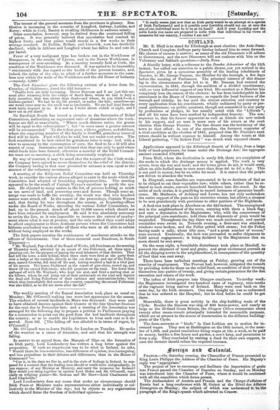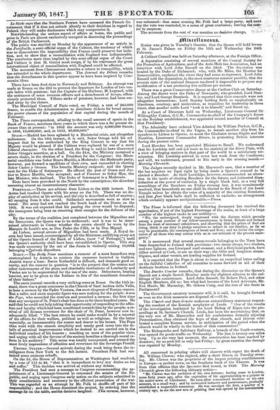goreign anti colonial.
FnAsee.—On Saturday evening, the Chancellor of France presented to King Louis Philippe the Address of the Chamber of Peers. His Majesty's reply was " appropriate."
The project of law to encourage and facilitate the importation of grain into France passed the Chamber of Deputies on Sunday, and on Monday was introduced into the Chamber of Peers, where it would be confirmed- with all the expedition which forms permit.
The Ambassadors of Austria and Prussia and the Chargé-d'affaires of Russia had a long conference with M. Guizot at the Motel des A ffaires Etrangeres on Monday; the subject of which was understood to he the paragraph of the King's speech which adverted to Cracow.
Le Side says that the Northern Powers have menaced the French Go vernment, that if it does not submit silently to their decisions in regard to Poland, they will make disclosures which may compromise it. Notwithstanding the serious aspect of affairs at home, the public and press in Paris are almost exclusively occupied in discussing the proceedings of the British Parliament.
The public was startled on Monday by the appearance of an article in the Portfeuille, a semi-official organ of the Cabinet, the tendency of which was to demonstrate the impossibility that France could preserve her isola- tion, and to show that a reconciliation with England was indispensable. The conclusion more than implied by this semi-official organ of the Court and Cabinet is that IL Guizot must resign, if by his retirement the great international object of reoonciliation with England could be effected.
The accounts from Chateauroux describe a return to tranquillity, which has extended to the whole department. The Journal des Dibats remarks that the disturbances in this quarter appear to have been inspired by Com- munist ideas.
There have been food-riots in Normandy and Brittany. An attempt was made at Rouen on the 22d to prevent the departure for London of two ves- sels laden with potatoes; but the Captain of the Harbour, M. Legend, with the assistance of some revenue•officers and a detachment of troops, effica- ciously protected them. Fifteen sacks of potatoes, however, had been car- ried away by the rioters. The Municipal Council of Paris voted, on Friday, a sum of 260,000 francs, to enable the Administration to distribute tickets for bread among the poorer classes of the population of that capital during the month of February. The Times correspondent, alluding to the small amount of specie in the Bank of France, mentions three years in which there was a far greater de- crease than at present: "in 1802 the amount was only 6,000,000 francs; in 1806, 13,000,000; and, in 1812, 49,000,000."
SPAIN.—Madrid has been agitated by a Ministerial crisis, not altogether unforeseen. On the 18th instant, it is said, Senor Ortega told his col leagues that he was authorized by the King Consort to say that his Majesty would be pleased if the Cabinet were replaced by one of a more Liberal character. On the other hand, the King is said to have disavowed Senor Ortega's assertion, at a ball. On the 21st, the Ministry sustained a severe shake, in the election of a President for the Congreso: the Minis- terial candidate was Senor Bravo Murillo, a Moderado: the Moderado party, however, put forward a candidate of their own, and succeeded in electing Senor Castro y Orozco. The Isturitz Ministry resigned; and the Queen sent for the Duke of Sotomayor. He offered the post of Grace and Jus- tice to Bravo Murillo, who accepted; and of Finance to Senor Mon, the late Minister, who declined. The Duke of Sotomayor is a Moderado.
Riots have been provoked in the North by the conscription; the disorders assuming almost an insurrectionary character.
PaavuGsr...—There are advices from Lisbon to the 20th instant. Des Antes had reached Oporto with his army on the 7th. There was no dis- play of satisfaction at his arrival, and the city is described as full of anxiety; all escaping from it who could. Saldanha's movements were as slow as usual. His army had not reached the South bank of the Douro on the 19th. It was not expected that his passing the river would be disputed; the insurgents being bent on reserving their energies for the defence of the city. By the terms of the coalition just completed between the Miguelites and the Democrats, the Queen was to be dethroned; and it was to be deter- mined afterwards in Cortes whether the crown should be worn by the Marquis de Louie's son, as Don Pedro the Fifth, or by Don Miguel.
At Lisbon, several arrests of Miguelites had been made. A Royal de- cree had been issued, countersigned by all the Ministers, nullifying every act of the Oporto branch of the Bank of Lisbon, (now " of Portugal,") until the Queen's authority shall have been reestablished in Oporto. This step was made necessary by the act of the Junta in violently seizing 10,0001. belonging toprivate depositors.
HALL—The Daily News mentions a rumour of a most hazardous step contemplated by Austria to retrieve the expenses incurred in Gallicia. Austria wants a loan: Baron Rothschild is difficult, and demands good se- curity, and the rumour in question " is to the purport that the estates and other endowments of the pious and charitable institutions of Lombardy and Venice are to be sequestrated for the use of the state. Debentures, bearing Interest, are to be given to the Italians in lieu of the munificent donations of their fathers."
The same journal records a very striking scene at Rome. On the 13th in- stant, there was a great concourse in the Church of Sant' Andrea della Valle, to hear a sermon by the Padre Ventura, the most eloquent of Roman orators. But a taller and more majestic figure was seen making for the pulpit: it was the Pope, who ascended the rostrum and preached a sermon; the first time that any occupant of St. Peter's chair has done so for three hundred years. He said that he could not help taking that opportunity of responding to the affec- tion and loyalty which had been manifested towards him by the people; a re- vival of old Roman reverence for the chair of St. Peter, however now in- adequately filled. " The best return he could make would be by a renewal of his efforts for their welfare, political as well as religious; for the latter especially, as immeasurably the nearer and dearer to his breast. The Pope then went with the utmost simplicity and manly good sense into the de- tails of practical improvements which he desired to see carried out in the individual conduct of his hearers ; touching on most of the popular vices, and urging with all the fervour of the ancient homilies a thorough moral re- form in his auditory." This scene was totally unexpected, and created the most lively impressions of affection and reverence for the Sovereign Pontiff.
Munro STATES.—Several arrivals daring the week bring down the in- telligence from New York to the 8th instant. President Polk had sus- tained some ominous rebuffs.
On the 2d, the House of Representatives at Washington had resolved, by a vote of 115 to 48, " that it is inexpedient to levy any duties on tea and coffee." This decision was arrived at without any debate.
The President had sent a message to Congress recommending the ap- pointment of a Lieutenant-General to command the armies of the Re- public, and urging upon Congress early action on the subjects submitted to their consideration and necessary to the efficient prosecution of the war. This was regarded as an attempt by Mr. Polk to shuffle off part of his responsibility; and the House dismissed the project, by ordering that the message lie on the table, amidst derisive laughter. This reverse, however, was redeemed: that same evening Mr. Polk had a large party, and next day the vote was rescinded, in a scene of great confusion; leaving th8 mat- ter in suspense. The accounts from the seat of war mention no decisive change, IX Ad



































 Previous page
Previous page